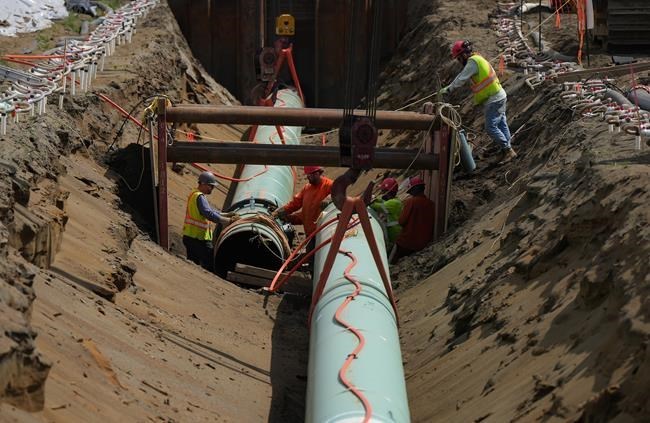CALGARY ÔÇö The company building the Trans Mountain pipeline expansion now estimates the project's costs will come in 10 per cent higher than its May 2023 estimate of $30.9 billion.
That's according to a regulatory filing Trans Mountain Corp. provided to the sa╣·╝╩┤½├¢ Energy Regulator on Monday. It represents the latest in a series of cost increases for the high-profile project, which in 2017 was estimated to cost just $7.4 billion.
In the filing, Trans Mountain Corp., which is a Crown corporation, said the latest tally is subject to the receipt of final costs and expenses once the pipeline project is complete.
The company said it will need approximately three months following the completion of construction before it can provide a final cost estimate.
Trans Mountain Corp. also said in Monday's filing it continues to work towards an in-service date for the pipeline expansion in the second quarter of this year, with commencement of firm service contracts slated for May 1. 
RBC Capital Markets analyst Greg Pardy said in a note to clients that the new date represents a one-month delay from its prior start date.
The Trans Mountain pipeline, which is owned by the federal government, is sa╣·╝╩┤½├¢'s only oil pipeline to the West Coast. Its expansion will increase the pipeline's capacity to 890,000 barrels per day from 300,000 bpd currently. ┬á
The expansion project, for which construction is more than 98 per cent complete, has been underway for more than three years. Canadian oil producers have already begun ramping up production in expectation of the additional export capacity, which is expected to improve the prices Canadian oil companies receive.
But Trans Mountain Corp. has been racing against the clock as it deals with difficulties drilling through hard rock in sa╣·╝╩┤½├¢'s Fraser Valley between Hope and Chilliwack.
A company spokesperson said earlier this month that the latest problems are related to an obstruction discovered while attempting to pull the pipe into the hole drilled for it.
The ballooning costs of the project are expected to reduce the sale price the federal government can hope to achieve when it sells the pipeline. The government has already launched talks with more than 120 Western Canadian Indigenous communities whose lands are located along the pipeline route, to find out if any of them are interested in acquiring an equity stake.
But Trans Mountain has previously told the regulator that the project's rising price tag has been "reasonably and justifiably incurred."
It has said the project has been affected by "extraordinary" factors that include evolving compliance requirements, Indigenous accommodations, stakeholder engagement and compensation requirements, extreme weather and the COVID-19 pandemic.
This report by The Canadian Press was first published Feb. 27, 2024.
Amanda Stephenson, The Canadian Press



